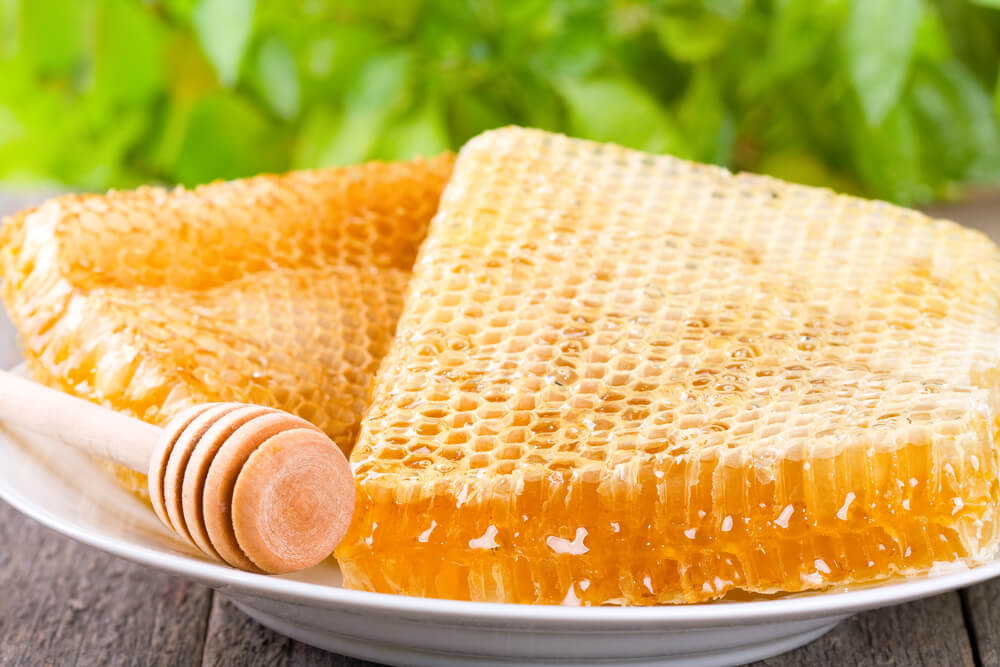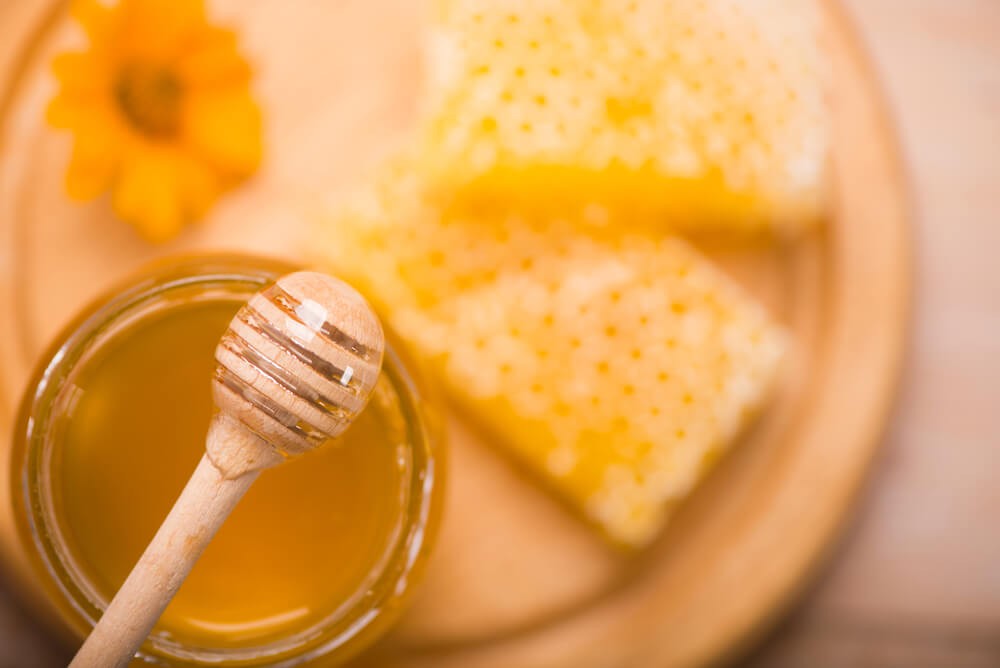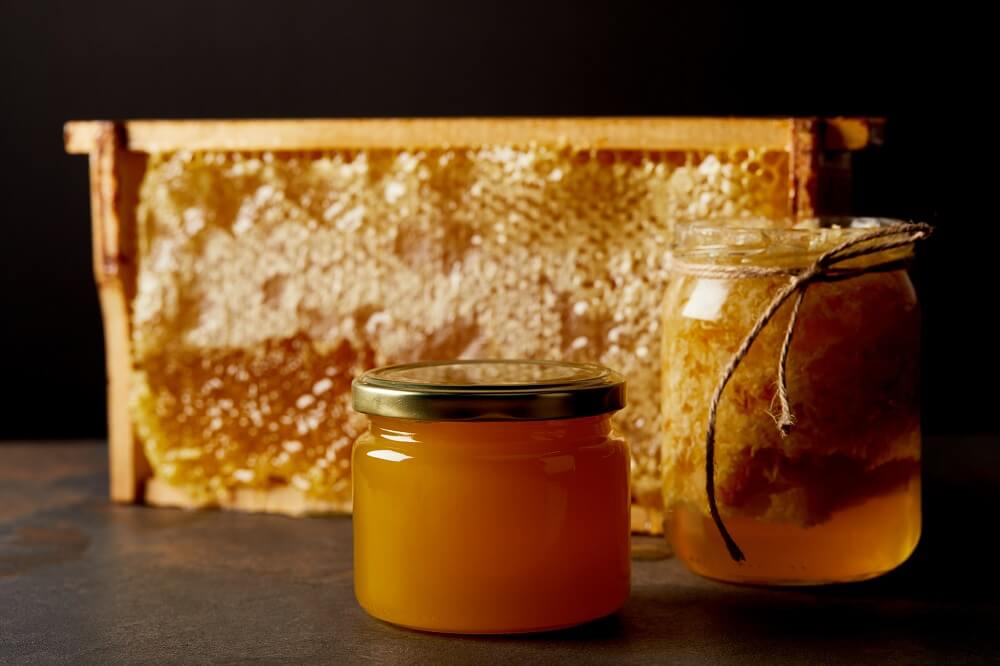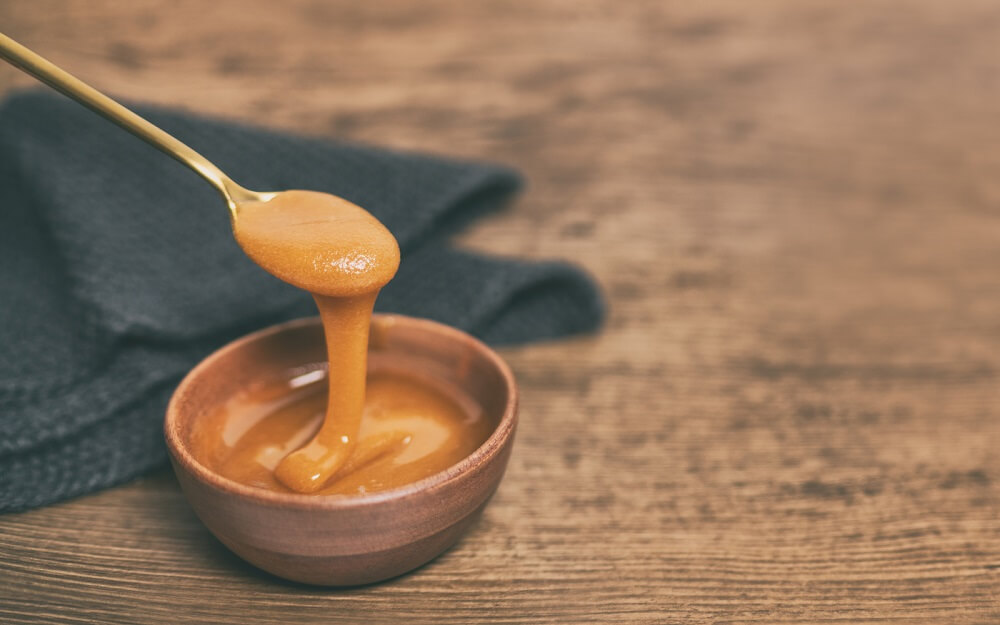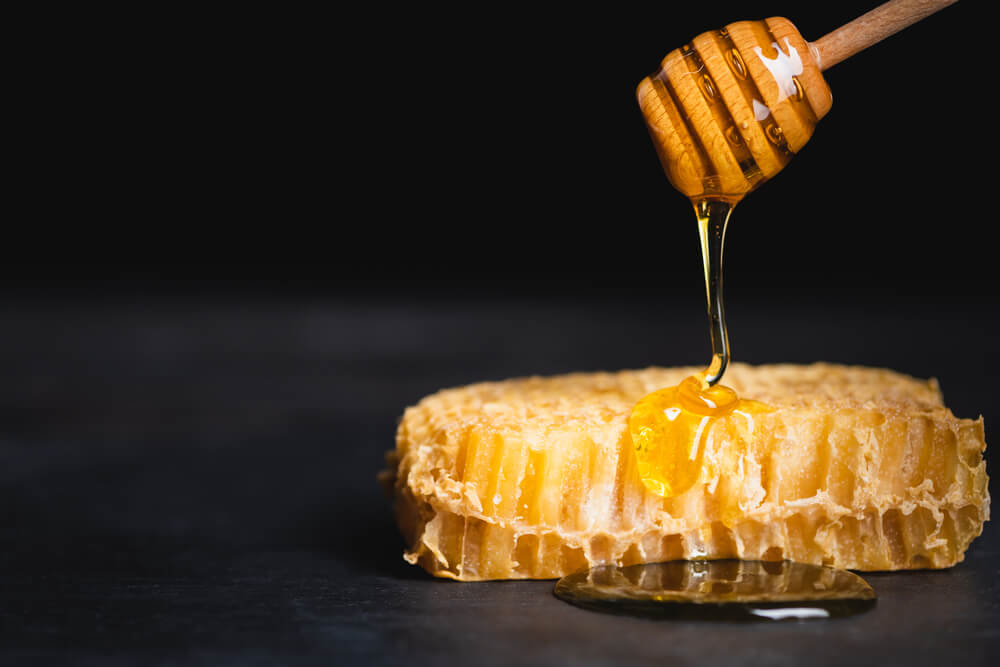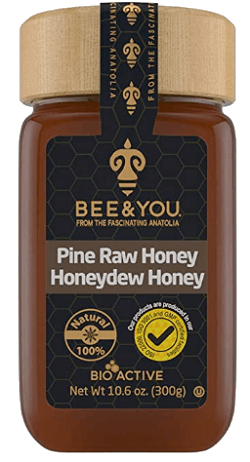Table of Contents:
What is Honeydew Honey?
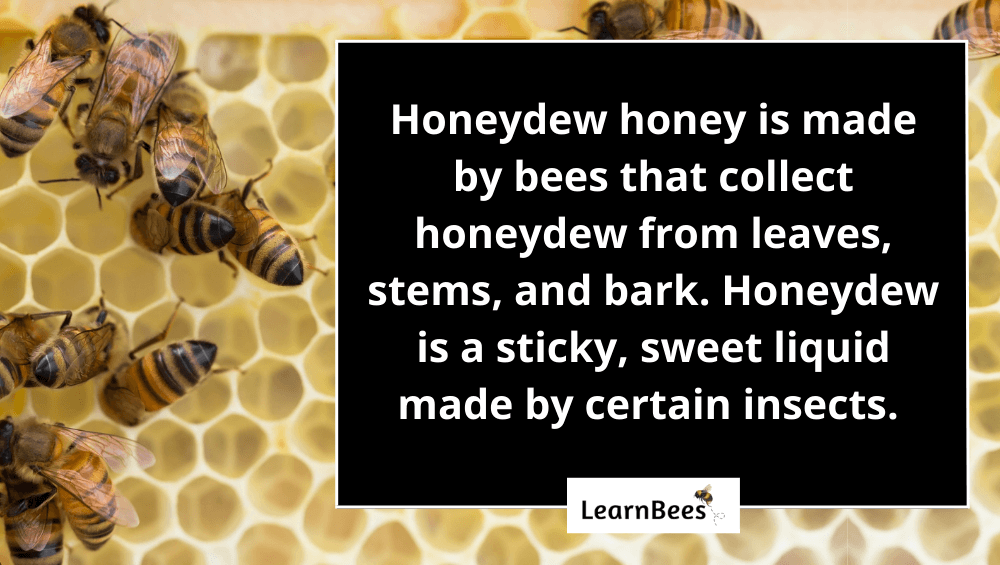
Honeydew honey is produced by honeybees that collect honeydew.
And here’s the interesting part:
‘Blossom honey’ and ‘honeydew honey’ are two different types of honey.
Honeydew honey is made from a sticky, sweet liquid produced by certain insects. This liquid is called honeydew and can be found on leaves, stems, and bark.(1)
Blossom honey comes from flowers. This is the most common type of honey that bees produce. Examples include wildflower honey and sunflower honey.
Now you might be wondering:
What does honeydew honey taste like?
Raw honeydew honey has a bold flavor with woodsy and earthy undertones. It’s typically less sweet than blossom honey, making it ideal for those who don’t want sickly sweet honey.
Honeydew honey makes for a delicious topping on warm biscuits and toast.
And more importantly?
Raw honey has anti-inflammatory, antiviral, and antifungal effects. Honey has been successfully used in medical settings to treat upper respiratory infections and skin conditions such as psoriasis and eczema.(2, 3, 4)
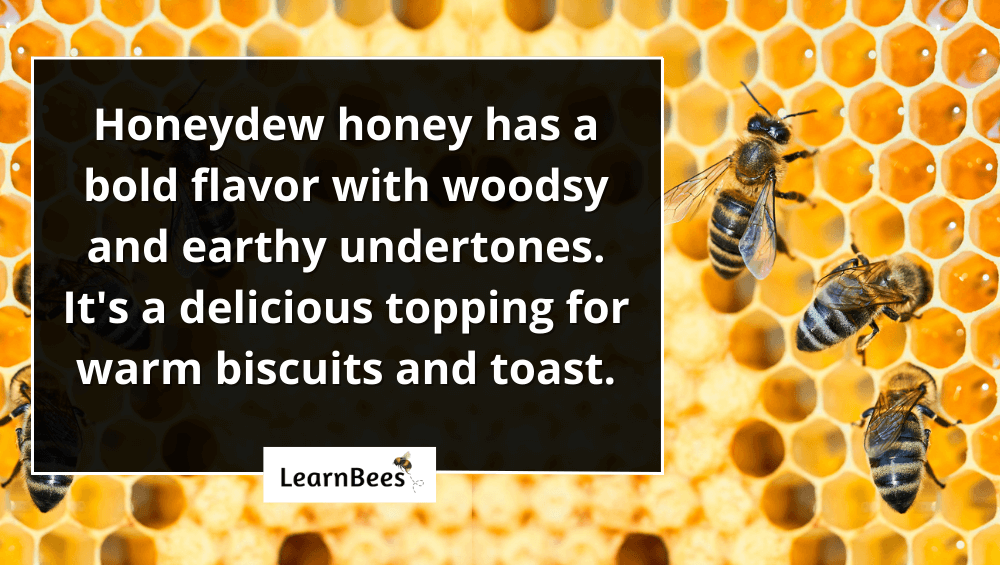
But here’s the deal:
These health benefits only come from raw, unprocessed honey.
Raw honeydew honey has been left in its original condition, just as nature intended it.
Why does this matter?
Because honey that’s been pasteurized no longer possesses antibacterial, anti-inflammatory, or antiviral capabilities. Furthermore, some honey producers use artificial sweeteners to dilute their honey.(5, 6)
As a result, the FDA warns consumers that overly processed honey isn’t genuine honey.(7)
So here’s our advice:
Choose raw honeydew honey over the processed stuff. This allows you to get the health advantages of raw honey plus the unique flavor.
And as a general rule?
Look for honey jars that say “raw” on the label to ensure you’re getting the real deal.
What Are the Benefits of Honeydew Honey?
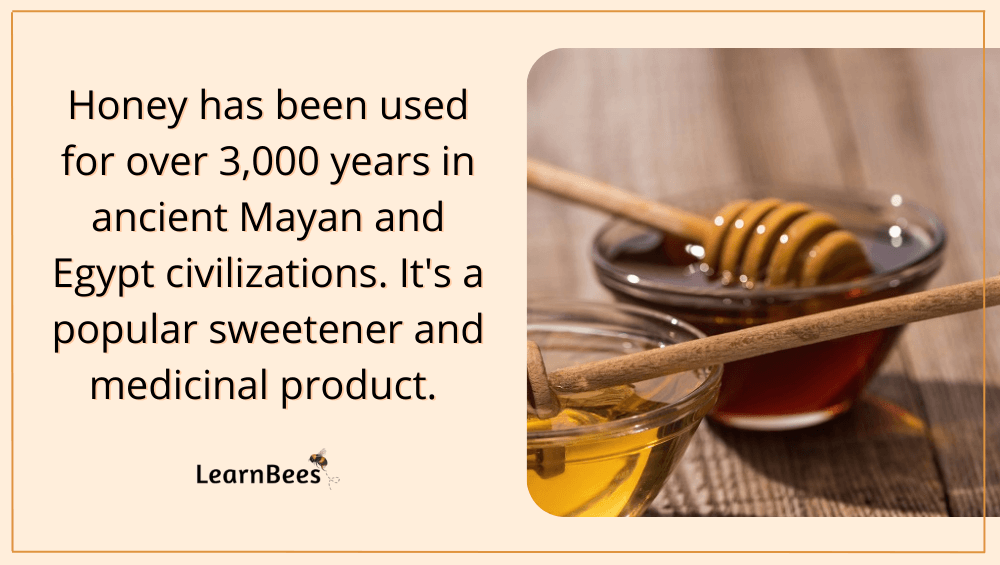
Honeydew Honey Nutrition
A single tablespoon of honeydew honey contains:
- Calories: 60 calories
- Protein: 0 grams
- Fat: 0 grams
- Carbs: 17 grams
- Sugars: 16 grams
So what are the honeydew honey benefits?
Here are a few:
Benefit 1: Honey is a Quality Source of Antioxidants
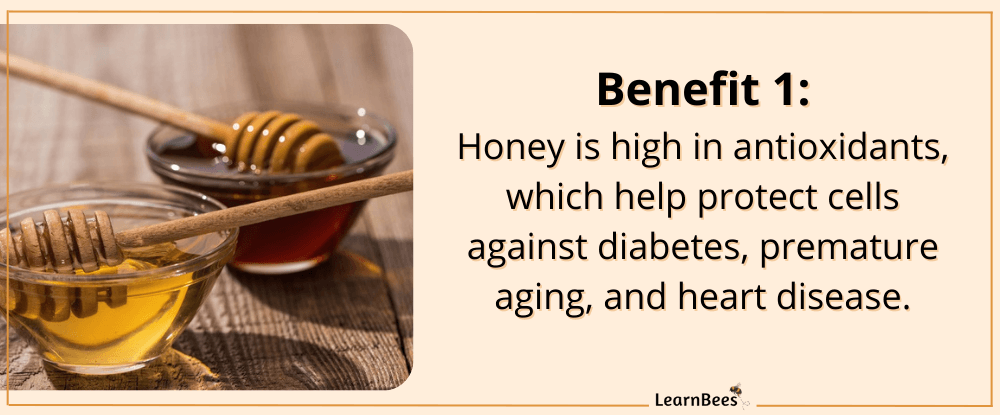
Honey has antioxidant properties, such as flavonoids and phenolic acids, which have been shown to prevent cell damage. Cell damage can lead to heart disease, type 2 diabetes, and early aging.(8)
Honey’s antioxidants have anti-inflammatory properties, which may aid in the prevention of illnesses associated with oxidative stress.(9)
Raw honey contains bee propolis and pollen, both of which have health benefits. Furthermore, studies have shown raw honey improves the cardiovascular, respiratory, digestive, and nervous systems.(10)
Benefit 2: Honey Can Treat Wounds and Skin Conditions
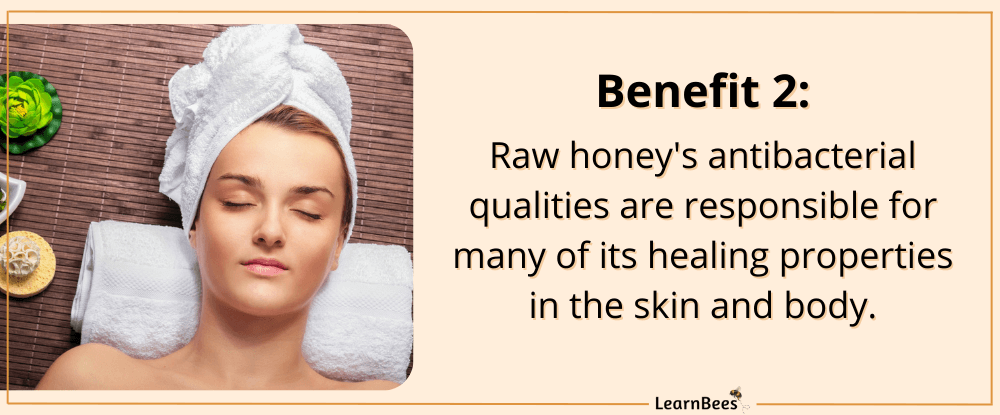
Honey has been used in clinical practice as a topical wound treatment. Its antibacterial, antifungal, and anti-inflammatory qualities make it powerful for treating skin injuries.(11, 12)
Honey has been shown to have antimicrobial characteristics that may prevent germs from spreading. As a result, honey can aid in wound healing.(13, 14)
Raw honey was discovered in a study to help with post-surgery infections.(15)
According to several studies, it’s also been used to treat diabetic foot ulcers. Foot ulcers are open wounds that develop at the bottom of the foot and can be extremely dangerous. In some situations, they might result in foot loss.
According to one study, honey had a 43.3% success rate in curing diabetes-related foot ulcers. Honey was also found in a separate study to heal 97% of diabetes-related ulcers.(16)
Honey has also been found to help with various skin issues, such as herpes lesions and psoriasis.(17)
Benefit 3: Honey May Keep Your Heart Healthy
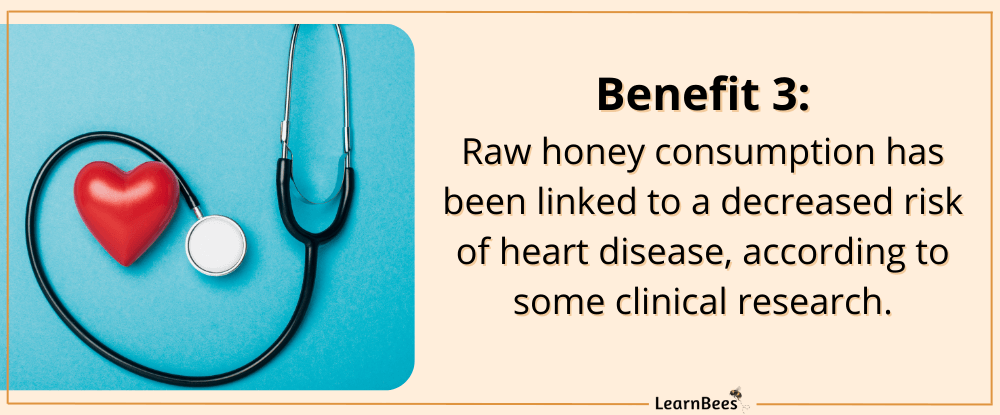
Raw honey has been found to potentially lower the risk of heart disease.
Honey consumption, according to the research of over 4,500 individuals, may help reduce the risk of high blood pressure.(18)
It also has been shown to regulate the heart and improve blood fat levels. As such, honey may aid in the maintenance of general heart health.(19)
According to researchers, honey was observed in a rat study to help prevent oxidative stress in the heart.(20)
Propolis is a chemical that honeybees make from sap-producing trees. It is also found in raw honey. Studies have shown that propolis has triglyceride-lowering and cholesterol-lowering effects.(21)
Benefit 4: Honey is a Proven Treatment for Upper Respiratory Infections
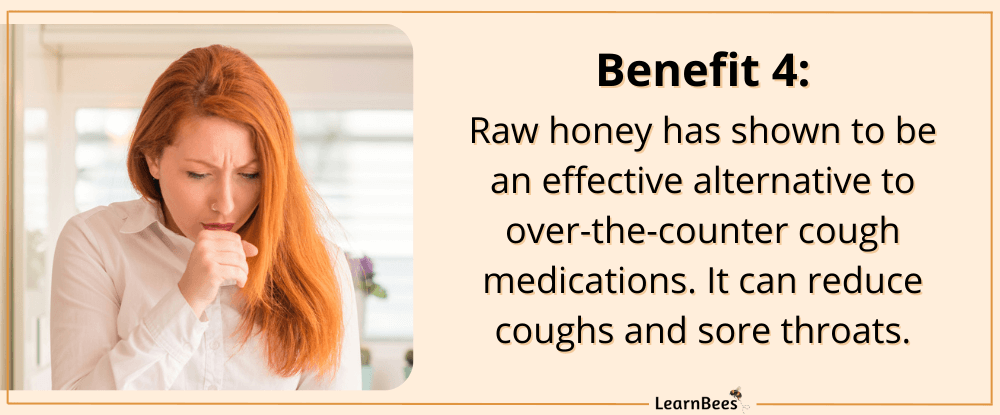
Upper respiratory infections are linked to various symptoms, including sore throats and coughs. Upper respiratory infections can disturb sleep.
Raw honey has been found to aid in treating sore throats and cough, with some studies suggesting it might be a good alternative to cough medicine.(22)
More specifically, honey has been found to be more effective than diphenhydramine (a cough medicine ingredient) in alleviating cough symptoms.(23)
Honey can aid in the alleviation of cough by soothing the throat. As a result, honey has been discovered to help with upper respiratory infections.(24)
According to other research, honey has improved the quality of children’s and parents’ sleep by reducing coughs.(25)
Honey, unlike over-the-counter cough medicines, has no negative effects. However, honey should not be fed to children under one year old because of the potential risk of infant botulism.(26)
With that in mind, honey is safe to feed to children when they’re older than 12 months.
What Are the Risks of Honeydew Honey?
Honey is typically safe for most people to eat. Both honey and honeycomb are low-risk foods.
But are there any side effects of honeydew honey?
Yes, there are two things to keep in mind:
Risk 1: Honey Can Be Dangerous to Newborns Under One-Year-Old
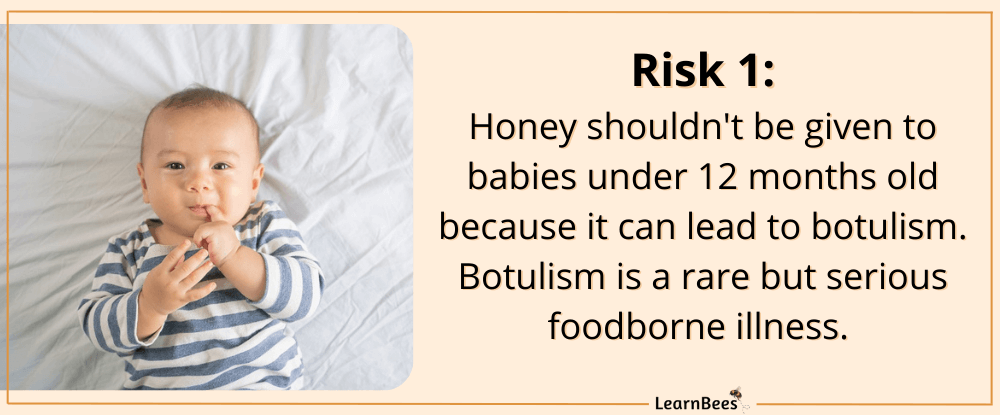
Honey is not advised for infants under one year old since it can lead to infant botulism.
The Clostridium botulinum bacteria causes infant botulism, which is a foodborne illness. It can damage the nervous system and lead to paralysis and respiratory failure.
Infants are susceptible to botulism from honey since their immune systems aren’t mature yet.
However, honey is generally considered safe for children aged 12 months or older.
Risk 2: Honey Can Cause Blood Sugar Levels to Rise
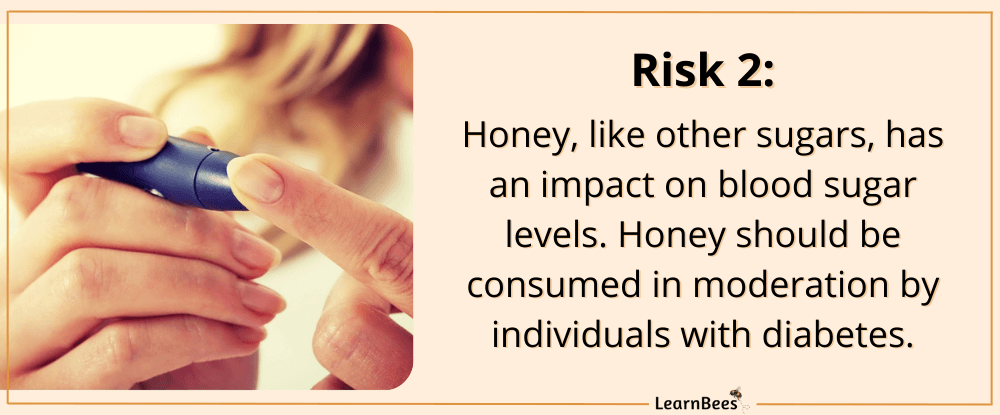
You’ve certainly heard that honey is a superior sweetener to table sugar. But while honey has health advantages, it should be used in moderation by those with diabetes.
Honey, like other sugars, can increase blood sugar levels. It also contains carbohydrates, which people using insulin need to be aware of.
FAQs on Honeydew Honey
- Is honeydew the same as honey?
- What is the honey made from honeydew called?
- Does honeydew honey crystallize?
- Is honeydew honey better for you?
- What is the taste of honeydew honey?
- Is honeydew honey pure honey?
- Does honeydew honey come from bees?
- Can you buy honeydew honey with honeycomb?
- Is honeydew honey in tea good?
- Is honeydew honey vegan?
- Can honeydew honey be used for weight loss?
- What color is honeydew honey?
- How do you take honeydew honey?
- Is honeydew honey safe?
- Is honeydew honey beneficial to the skin?
- Where can I buy honeydew honey?
- What’s the difference between honeydew honey vs. manuka honey?
Is honeydew the same as honey?
No, honeydew is not the same as honey. Honeydew is a sweet, sticky substance that is secreted by insects. The honeybees collect the honeydew to make honey.
Remember:
There are two types of honeydew honey – blossom honey and honeydew honey. Blossom honey is made from the nectar of flowers, while honeydew honey is made from the secretions of insects.
Blossom honey is more common.
—> Go back to the FAQs on honeydew honey
More to Explore:
What is the honey made from honeydew called?
It’s called honeydew honey. Sometimes it’s also called pine honey, forest honey, bug honey, fir honey, oak honey, flea honey, or tree honey.
Honeydew honey is produced by bees that collect the honeydew secretions of insects. The honey is very dark in color and less sweet than other types of honey. Some people enjoy the taste, while others consider it too earthy for their preference.
—> Go back to the FAQs on honeydew honey
More to Explore:
Does honeydew honey crystallize?
Yes, honeydew honey will crystallize over time. Crystallization is a natural process that happens to all types of honey. You can slow the crystallization of honey by storing it at room temperature.
But don’t worry:
Crystallized honey is still safe to eat. Just place the jar of honey in hot water to liquify it.
—> Go back to the FAQs on honeydew honey
More to Explore:
Is honeydew honey better for you?
People often ask, “What is honeydew honey good for?”
Raw honeydew honey is packed with nutrients and antioxidants. It has antibacterial and anti-inflammatory properties that are beneficial to the skin and for treating upper repository infections.
That said, we don’t have any scientific research showing that honeydew honey is better than other types of honey.
—> Go back to the FAQs on honeydew honey
More to Explore:
- The Top 3 Best Manuka Honey Brands
- Orange Blossom Honey: Uses, Benefits, & Risks
- Sourwood Honey: Uses, Benefits, & Risks
What is the taste of honeydew honey?
People regularly ask, “What does honeydew honey taste like?”
Honeydew honey has a bold flavor with an earthy undertone. It’s typically less sweet than other types of honey.
—> Go back to the FAQs on honeydew honey
More to Explore:
Is honeydew honey pure honey?
It depends. Raw honeydew honey is pure honey. But some brands may add sugar or other sweeteners to processed honey. Always check the label to ensure that the honey says “raw” on it.
—> Go back to the FAQs on honeydew honey
More to Explore:
- The Brutally Honest Truth About Sour Honey
- Buckwheat Honey: Uses, Benefits, & Risks
- Can You Eat Honeycombs?
Does honeydew honey come from bees?
People often ask:
Where does honeydew honey come from? Do bees use honeydew?
Honeydew honey comes from bees that collect the honeydew off of leaves, branches, and stems of plants or trees. Honeydew is secreted by certain insects.
The honeybees collect the honeydew and then take it back to the hive, where they use it to make honey. Honeybees fan their wings to evaporate the water out of the honeydew, which helps turn it into honey.
—> Go back to the FAQs on honeydew honey
More to Explore:
Can you buy honeydew honey with honeycomb?
Yes, you can. Just like other types of honey, honeydew honey is available with or without the comb. The best way to buy honeydew with the comb is from a local beekeeper. You may also find it from some online retailers.
Honeycomb is safe to eat. You can also chew it like gum or spit it out if you don’t care for the taste.
—> Go back to the FAQs on honeydew honey
More to Explore:
Is honeydew honey in tea good?
Some people like the bold flavor of honeydew honey in tea, while others find it too strong. If you’re unsure, start by adding a little honey to your tea and see how you like it. You can always add more if you want a sweeter cup of tea.
—> Go back to the FAQs on honeydew honey
More to Explore:
Is honeydew honey vegan?
No, honeydew honey is not vegan. It’s made by bees that collect the honeydew secretions from plants or trees. As such, honeydew honey is not considered vegan.
—> Go back to the FAQs on honeydew honey
More to Explore:
- Honey for Skin Benefits: Directions, Uses, & Risks
- 8 Scientific Benefits of Raw Honey
- Allergic to Honey: Signs of a Honey Allergy + Treatment
Can honeydew honey be used for weight loss?
Honey isn’t recommended for people wanting to lose weight. It’s high in sugars, carbs, and calories. This is why honey should be eaten in moderation if you’re dieting.
—> Go back to the FAQs on honeydew honey
More to Explore:
What color is honeydew honey?
Honeydew honey is typically dark in color – usually in a shade of amber or brown.
—> Go back to the FAQs on honeydew honey
More to Explore:
How do you take honeydew honey?
Honeydew honey can be eaten straight off the spoon, used as a sweetener in tea or coffee, or added to recipes in place of sugar. It tastes delicious with yogurt, oatmeal, or toast.
—> Go back to the FAQs on honeydew honey
More to Explore:
- Honey For Allergies: Is it a Potential Cure?
- What’s the Melting Point of Beeswax?
- Is Honey Acidic or Alkaline?
Is honeydew honey safe?
Yes, honeydew honey is safe to eat for most people.
With that said, there are two things to consider:
- Children under the age of one should not eat honeydew honey because they are at risk for botulism. Botulism is caused by bacteria that can sometimes be found in honey. So wait until your child is over 12 months old before feeding honey to them.
- People with diabetes should be careful when eating honeydew honey because it can cause a spike in blood sugar levels. This is due to the natural sugar content in honey.
—> Go back to the FAQs on honeydew honey
More to Explore:
- Fermented Garlic and Honey Recipe
- Cinnamon Honey: Are There Health Benefits?
- How to Substitute Honey for Sugar
Is honeydew honey beneficial to the skin?
Yes, raw honeydew honey has skin benefits. Honey has antibacterial and anti-inflammatory properties that can help treat skin conditions such as eczema and psoriasis.
To use honeydew honey on the skin, simply apply it to the affected area and leave it on for 20-30 minutes. Rinse it off with warm water and pat your skin dry.
—> Go back to the FAQs on honeydew honey
More to Explore:
- Beeswax on Hair: Benefits, Risks, & How to Use It
- How to Make Fermented Honey
- Does Honey Need to Be Refrigerated?
Where can I buy honeydew honey?
Honeydew honey can be bought from some local beekeepers. If you don’t have a local beekeeper near you, you can purchase honeydew honey online.
The critical thing to remember is that the honey label should say “raw honey” on it. This is because raw honey contains benefits such as enzymes, vitamins, and minerals.
—> Go back to the FAQs on honeydew honey
More to Explore:
- Honey for the Face: Can You Apply it to the Skin?
- Beeswax vs. Soy Wax: Which is Better for Candle Making?
- Does Honey Need to Be Refrigerated?
What’s the difference between honeydew honey vs. manuka honey?
The main difference between honeydew honey and manuka honey is the source of the honey. Honeydew honey comes from bees that collect the honeydew secretions from plants or trees. On the other hand, manuka honey comes from bees that collect the nectar from the manuka tree.
Manuka honey is more expensive than honeydew honey because it’s rarer and harder to find. Additionally, manuka honey has been studied more in clinical settings than honeydew honey has.
With that said:
This doesn’t mean manuka honey is healthier than honeydew honey.
There has been no scientific research comparing the health benefits of the two types of honey.
—> Go back to the FAQs on honeydew honey
